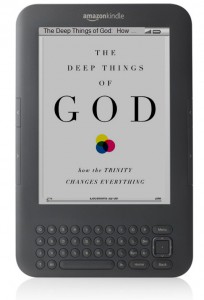 I’m planning to be up to speed with the Kindle just about the time it’s being phased out in favor of the next big thing. Call it my new media strategy.
I’m planning to be up to speed with the Kindle just about the time it’s being phased out in favor of the next big thing. Call it my new media strategy.
But I certainly see the benefits of e-books, and am looking forward to a trans-Atlantic flight this summer without 30 pounds of books in my luggage. And if my students and I can all get on the same digital page, we’ll cut our combined luggage weight by nearly 1,000 pounds.
I also bought the Kindle edition of my own book, The Deep Things of God, to see what that was like. A feature I enjoy as the author is the “Show Popular Highlights” option. It lets me see which passages have been most frequently highlighted by readers. For all I know, this could be a new arena where narcissism meets eavesdropping, some kind of high-tech irresistible temptation for authors. It could also lead to an interference loop, in which writers try to repeat their successful sentences, giving the people more of the kind of sentences they want. But I’m not sure that’s a bad thing.
As far as I can tell, the people who are highlighting The Deep Things of God have remarkably good sense about the best quotations. I think their votes provide a better sample of the book than I could have put together myself. Here they are, in order of popularity, most popular first:
The gospel is Trinitarian, and the Trinity is the gospel. Christian salvation comes from the Trinity, happens through the Trinity, and brings us home to the Trinity. p. 10
The gospel is so deep that it not only meets our deepest needs but comes from God’s deepest self. p. 13
Most evangelical Christians don’t need to be talked into the Trinitarian theory, they need to be shown that they are immersed in the Trinitarian reality. p. 34
When evangelicalism wanes into an anemic condition, as it sadly has in recent decades, it happens in this way: the points of emphasis are isolated from the main body of Christian truth and handled as if they are the whole story rather than the key points. p. 16
Christians should recognize that when we start thinking about the Trinity, we do so because we find ourselves already deeply involved in the reality of God’s triune life as he has opened it up to us for our salvation and revealed it in the Bible. p. 27
A gospel which is only about the moment of conversion but does not extend to every moment of life in Christ is too small. A gospel that gets your sins forgiven but offers no power for transformation is too small. A gospel that isolates one of the benefits of union with Christ and ignores all the others is too small. A gospel that must be measured by your own moral conduct, social conscience, or religious experience is too small. A gospel that rearranges the components of your life but does not put you personally in the presence of God is too small. p. 106
The Trinity isn’t for anything beyond itself, because the Trinity is God. God is God in this way: God’s way of being God is to be Father, Son, and Holy Spirit simultaneously from all eternity, perfectly complete in a triune fellowship of love. p. 62
The good news of the gospel is that God has opened up the dynamics of his triune life and given us a share in that fellowship. p. 62
The central argument of this book is that the doctrine of the Trinity inherently belongs to the gospel itself. p. 9
Nothing we do as evangelicals makes sense if it is divorced from a strong experiential and doctrinal grasp of the coordinated work of Jesus and the Spirit, worked out against the horizon of the Father’s love. Personal evangelism, conversational prayer, devotional Bible study, authoritative preaching, world missions, and assurance of salvation all presuppose that life in the gospel is life in communion with the Trinity. Forget the Trinity and you forget why we do what we do; you forget who we are as gospel Christians; you forget how we got to be like we are. p. 9